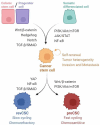Targeted Treatment against Cancer Stem Cells in Colorectal Cancer
- PMID: 38892410
- PMCID: PMC11172446
- DOI: 10.3390/ijms25116220
Targeted Treatment against Cancer Stem Cells in Colorectal Cancer
Abstract
The cancer stem cell (SC) theory proposes that a population of SCs serves as the driving force behind fundamental tumor processes, including metastasis, recurrence, and resistance to therapy. The standard of care for patients with stage III and high-risk stage II colorectal cancer (CRC) includes surgery and adjuvant chemotherapy. Fluoropyrimidines and their combination with oxaliplatin increased the cure rates, being able to eradicate the occult metastatic SC in a fraction of patients. The treatment for unresectable metastatic CRC is based on chemotherapy, antibodies to VEGF and EGFR, and tyrosine-kinase inhibitors. Immunotherapy is used in MSI-H tumors. Currently used drugs target dividing cells and, while often effective at debulking tumor mass, these agents have largely failed to cure metastatic disease. SCs are generated either due to genetic and epigenetic alterations in stem/progenitor cells or to the dedifferentiation of somatic cells where diverse signaling pathways such as Wnt/β-catenin, Hedgehog, Notch, TGF-β/SMAD, PI3K/Akt/mTOR, NF-κB, JAK/STAT, DNA damage response, and Hippo-YAP play a key role. Anti-neoplastic treatments could be improved by elimination of SCs, becoming an attractive target for the design of novel agents. Here, we present a review of clinical trials assessing the efficacy of targeted treatment focusing on these pathways in CRC.
Keywords: cancer stem cell; clinical trial; colorectal cancer; molecular targeted therapies.
Conflict of interest statement
J.M.-P. has received payment or honoraria for lectures, presentations, manuscript writing, or educational events from MSD, Bristol-Myers, Merck, Servier. M.V.-A. has received grants or contracts from Roche and Amgen and consulting fees from Amgen, Sanofi, Servier, and Bayer and payment or honoraria for lectures, presentations, speaker’s bureaus, manuscript writing, or educational events from MSD, Bristol-Myers, Merck, Servier, Amgen and participates on Advisory Boards of Amgen, Servier, and Merck. C.T. and M.A.D.-C. have no conflicts of interest.
Figures
Similar articles
-
Mechanisms and Strategies to Overcome Drug Resistance in Colorectal Cancer.Int J Mol Sci. 2025 Feb 25;26(5):1988. doi: 10.3390/ijms26051988. Int J Mol Sci. 2025. PMID: 40076613 Free PMC article. Review.
-
Emerging agents that target signaling pathways to eradicate colorectal cancer stem cells.Cancer Commun (Lond). 2021 Dec;41(12):1275-1313. doi: 10.1002/cac2.12235. Epub 2021 Nov 17. Cancer Commun (Lond). 2021. PMID: 34791817 Free PMC article. Review.
-
Bone morphogenetic protein 4 induces differentiation of colorectal cancer stem cells and increases their response to chemotherapy in mice.Gastroenterology. 2011 Jan;140(1):297-309. doi: 10.1053/j.gastro.2010.10.005. Epub 2010 Oct 14. Gastroenterology. 2011. PMID: 20951698
-
MiR-148a suppressed cell invasion and migration via targeting WNT10b and modulating β-catenin signaling in cisplatin-resistant colorectal cancer cells.Biomed Pharmacother. 2019 Jan;109:902-909. doi: 10.1016/j.biopha.2018.10.080. Epub 2018 Nov 5. Biomed Pharmacother. 2019. PMID: 30551544
-
UCN-01 enhances cytotoxicity of irinotecan in colorectal cancer stem-like cells by impairing DNA damage response.Oncotarget. 2016 Jul 12;7(28):44113-44128. doi: 10.18632/oncotarget.9859. Oncotarget. 2016. PMID: 27286453 Free PMC article.
Cited by
-
Comprehensive review of drug resistance in mammalian cancer stem cells: implications for cancer therapy.Cancer Cell Int. 2024 Dec 18;24(1):406. doi: 10.1186/s12935-024-03558-0. Cancer Cell Int. 2024. PMID: 39695669 Free PMC article. Review.
-
Mechanisms and Strategies to Overcome Drug Resistance in Colorectal Cancer.Int J Mol Sci. 2025 Feb 25;26(5):1988. doi: 10.3390/ijms26051988. Int J Mol Sci. 2025. PMID: 40076613 Free PMC article. Review.
-
Novel Lysosomal-Associated Transmembrane Protein 4B-Positive Stem-Like Cell Subpopulation Characterizes High-Risk Colorectal Cancer Subtypes.MedComm (2020). 2025 Jul 13;6(7):e70284. doi: 10.1002/mco2.70284. eCollection 2025 Jul. MedComm (2020). 2025. PMID: 40661135 Free PMC article.
-
Effects of BYL-719 (alpelisib) on human breast cancer stem cells to overcome drug resistance in human breast cancer.Front Pharmacol. 2024 Oct 14;15:1443422. doi: 10.3389/fphar.2024.1443422. eCollection 2024. Front Pharmacol. 2024. PMID: 39469631 Free PMC article.
-
Decoding colorectal cancer lung metastasis: a global research odyssey.Front Oncol. 2025 Jul 24;15:1587422. doi: 10.3389/fonc.2025.1587422. eCollection 2025. Front Oncol. 2025. PMID: 40777130 Free PMC article.
References
Publication types
MeSH terms
Substances
LinkOut - more resources
Full Text Sources
Medical
Research Materials
Miscellaneous


